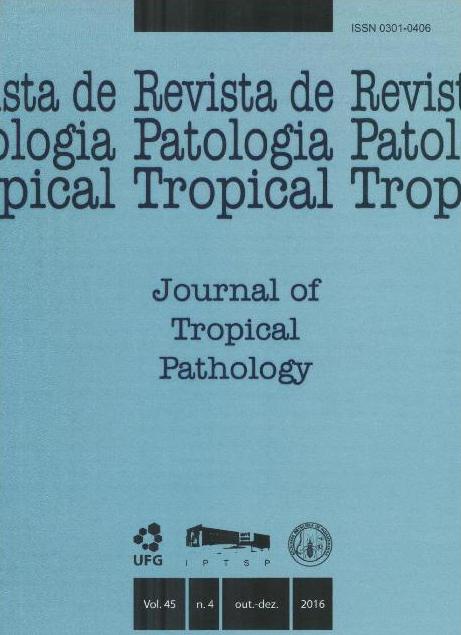DETECÇÃO DE DOENÇAS TRANSMISSÍVEIS EM GESTANTES NO ESTADO DE GOIÁS: O TESTE DA MAMÃE
DOI:
https://doi.org/10.5216/rpt.v45i4.44610Palavras-chave:
Gestação, doenças transmissíveis, prevenção, triagem, pré-natal.Resumo
Neste trabalho é descrita a triagem de doenças infecciosas em gestantes do estado de Goiás para detecção de agravos que podem ser transmitidos durante a gravidez e causar sequelas na criança.
A triagem é realizada por meio de programa da Secretaria Estadual da Saúde em parceria com a Associação de Pais e Amigos dos Excepcionais (APAE) e as Secretarias Municipais de Saúde.
A experiência da APAE na detecção de algumas doenças congênitas por teste simples em papel filtro foi aproveitada e seu uso expandido para a detecção de doenças infecciosas/transmissíveis.
De setembro de 2003 até junho de 2009 foram examinadas amostras de 348.037 gestantes.
Implantada progressivamente a partir de dois municípios, a triagem para doenças infecciosas está disponível em 245 dos 246 municípios do estado de Goiás. Os agravos triados foram: sífilis, HIV/Aids, toxoplasmose, rubéola, hepatites B e C, infecção pelo Trypanosoma cruzi, HTLV e citomegalovirose. A triagem foi realizada em papel filtro por testes imunoenzimáticos ELISA) para cada marcador e os resultados positivos foram confirmados por coleta de sangue venoso, cujo soro foi encaminhado a diferentes centros de referência. Foram identificadas 11.061 gestantes com resultados positivos. A confirmação após os testes com soro foi obtida em 10.496 (94,9%) amostras com as seguintes prevalências: sífilis: 4.028 (1,2%); toxoplasmose: 2.320 (0,7%), anticorpos anti-T. cruzi: 1.768 (0,5%); hepatite B: 956 (0,3%); HIV: 469 (0,1%), hepatite C: 334 (0,1%), HTLV: 312 (0,1%), rubéola: 181(0,05%) e fase aguda de citomegalovirose: 128 (0,04%). Os resultados foram encaminhados ao pré-natalista e ao núcleo de vigilância epidemiológica municipal.
Downloads
Downloads
Publicado
Como Citar
Edição
Seção
Licença
The manuscript submission must be accompanied by a letter signed by all authors stating their full name and email address, confirming that the manuscript or part of it has not been published or is under consideration for publication elsewhere, and agreeing to transfer copyright in all media and formats for Journal of Tropical Pathology.

